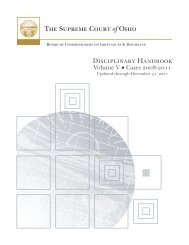State v. Winters - Supreme Court of Ohio - State of Ohio
State v. Winters - Supreme Court of Ohio - State of Ohio
State v. Winters - Supreme Court of Ohio - State of Ohio
Create successful ePaper yourself
Turn your PDF publications into a flip-book with our unique Google optimized e-Paper software.
directions and Ostrander told appellant which way to turn so that they could get away from<br />
the store.<br />
11.<br />
{ 25} As the police were pulling the car over, Ostrander told appellant to deny<br />
having been at Wal-Mart. At the same time, appellant was questioning Ostrander as to<br />
whether he had stolen something from the gas station or Wal-Mart. Ostrander denied<br />
owning the snips that were found in the car and believed they belonged to appellant whom<br />
Ostrander knew was having trouble with his car stereo and had plans to fix it. Ostrander<br />
denied knowing that appellant and Reichard had foil, a magnetic key, and snips on them.<br />
{ 26} Ostrander testified that he did not get a deal for testifying, but was doing so<br />
only because appellant was his friend and believed that appellant should not get in trouble<br />
for something Ostrander did.<br />
{ 27} In his first assignment <strong>of</strong> error, appellant argues that there was insufficient<br />
evidence to convict him <strong>of</strong> complicity to commit theft and possession <strong>of</strong> criminal tools.<br />
{ 28} A challenge to the sufficiency <strong>of</strong> the evidence is a question <strong>of</strong> law. <strong>State</strong> v.<br />
Thompkins, 78 <strong>Ohio</strong> St.3d 380, 386, reconsideration denied (1997), 79 <strong>Ohio</strong> St.3d 1451.<br />
The standard for determining whether there is sufficient evidence to support a conviction<br />
is whether the evidence admitted at trial, "if believed, would convince the average mind <strong>of</strong><br />
defendant's guilt beyond a reasonable doubt. The relevant inquiry is whether, after<br />
viewing the evidence in a light most favorable to the prosecution, any rational trier <strong>of</strong> fact<br />
could have found the essential elements <strong>of</strong> the crime proven beyond a reasonable doubt."<br />
<strong>State</strong> v. Jenks (1991), 61 <strong>Ohio</strong> St.3d 259, paragraph two <strong>of</strong> the syllabus, citing Jackson v.

















